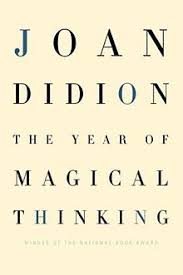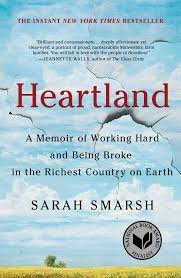Bright Light on Grief
Brilliant in several senses of the word, Joan Didion is inquisitive, worldly, and extraordinarily intelligent. When Didion seizes upon a topic, she shines her mighty powerful brilliance on it. I picture it as a hot white light, so intense, in fact, that it can sometimes overwhelm, flattening out colors and feelings.

The Year of Magical Thinking is Didion’s 2005 account of her year of grief following the death of her husband. He was her soul-mate, though she does not call him that. He is John Gregory Dunne and John through the book. John suffered a massive sudden heart-attack at the dinner table in their New York City apartment. John had a heart condition, so his death was not wholly unexpected, but it was extraordinarily traumatic. He was with her and then he was not. Didion is unsparing in her account of the impact, nature and effect of her loss. She processed, engaged, disengaged, and imagined all manner of things. It was a year that her brain simply could not accept the sadness of the unacceptable. Yet she persevered.
The year was further worsened by the grave illness of Didion’s daughter. Her book reports on both with clinical precision. At the same time, she knows that there can be no final clarity, no resolution. It is, after all, of thinking and not thinking, of numbing loss and overwhelming tears.
I can’t say that I was comforted by Didion’s book; nor would I say that she wrote it to provide comfort. It is not a broader study and it did not shed much light on grieving and loss writ large. I have experienced enough loss already to have formed some thoughts and to have done a fair bit of research. This book is not a source for any of that.
What The Year of Magical Thinking does extraordinarily well is explain Joan Didion’s experiences, her processes, her feelings. She’s a frightfully clever and interesting writer – and that, in and of itself, makes this an important book. It underscores, in a myriad of ways, the isolation of loss, both direct and existential. She writes with great courage, with precision, and insight into herself and what made her who she is. It is powerful prose.
The Year of Magical Thinking also made me wonder if it might sometimes be healthier healthier to think a little less. Asking and answering hard questions, it seems to me, may not always the best path to understanding.
David Potash
